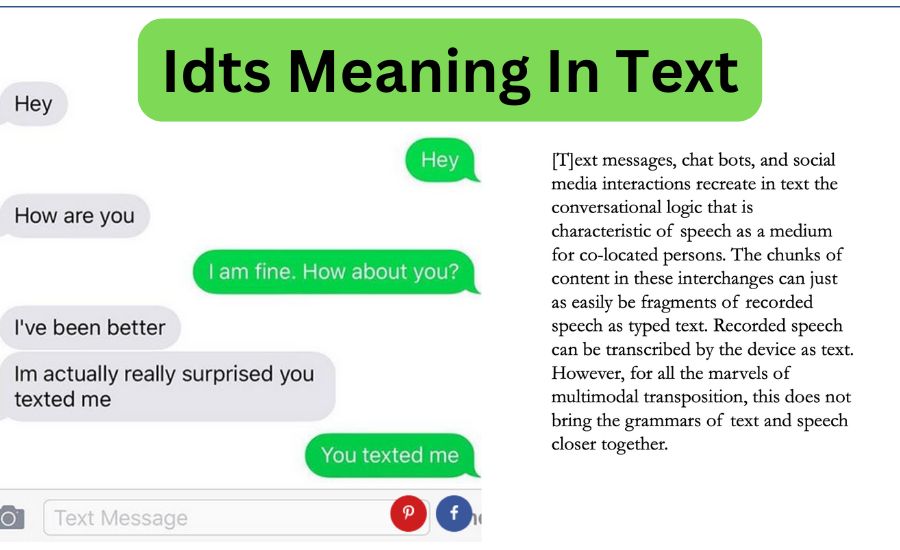The idts meaning in text may be tricky if you’re new to texting slang. So, what does “IDTS” mean when you see it in a message? IDTS stands for “I Don’t Think So.” It’s a quick way to tell someone you’re doubtful or don’t agree without needing to type out the whole sentence.
People use “IDTS” in text messages to express doubt or gentle disagreement. Imagine someone asks you if you’ll join them for a movie, but you’re not sure—that’s when you might reply with “IDTS.” It’s short, friendly, and gets right to the point. Let’s explore where and how “IDTS” is used in everyday texting!
What is the meaning of IDTS in text messages?
“IDTS” is a quick way of saying “I Don’t Think So” in text messages. People use it to gently disagree or show doubt. If a friend asks if you can meet up, but you’re unsure, you might reply with “IDTS.” It saves time and is common in casual texting.
This slang is popular because it’s short, friendly, and easy to understand. Using “IDTS” is like saying “probably not” without being too strong. Learning terms like this helps make texting faster and more fun!
Texting is full of slang like IDTS, making conversations quicker. With so many short forms, texting has become almost like its own language.
IDTS Meaning in Text: How It’s Used in Chats Today
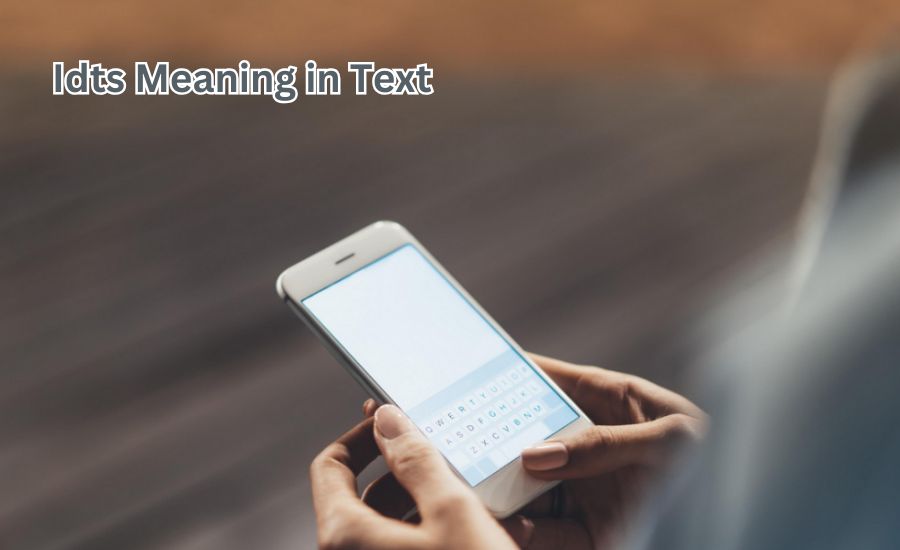
In texting, “IDTS” is a polite way to decline or disagree. If someone invites you somewhere, and you’re unsure, you can say “IDTS.” It’s not as strong as saying “no,” so it keeps things friendly.
Today, people often use “IDTS” in messages to save time. idts meaning in text widespread with friends or family. Using terms like “IDTS” helps keep conversations light and easy.
Texting slang like this is all about being quick and casual. Adding “IDTS” to your chats makes replies simpler and less formal.
Simple Ways to Use “IDTS” in Your Texts
Using idts meaning in text is simple. When you’re not sure about something or want to disagree, type “IDTS.” For example, if a friend asks, “Will you be at the game?” you can reply, “IDTS, but I’ll let you know!”
Adding “IDTS” to your chats helps you communicate quickly. It’s easy to type and still gets your point across politely. Try it in your next chat to see how it feels.
Short forms like “IDTS” are helpful for text. They let you reply faster, especially if you’re busy or need help to give a definite answer.
IDTS Meaning in Text: When to Use It and Why
You might use idts meaning in text when uncertain or want to politely say no. If a friend asks, “Are you coming to the party?” and you aren’t sure, “IDTS” is a gentle way to show doubt.
“IDTS” is great for keeping things friendly in chats. It’s a helpful term when you don’t want to sound harsh. This way, your message sounds soft even if you can’t commit.
Using “IDTS” helps you stay polite while still being honest. It’s perfect when you need more time or don’t want to say “no” too vehemently.
Read More: Is-rick-hoffman-gay
Why “IDTS” Has Become Popular in Texting Language
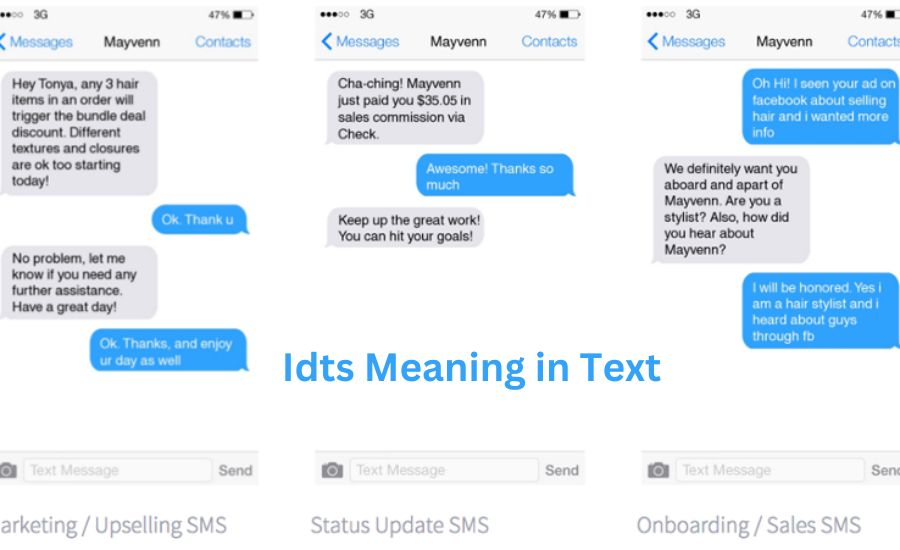
“idts meaning in text is popular because it’s short and easy. It helps people save time, and texting is all about quick replies. Instead of typing long sentences, “IDTS” does the job fast.
Many people prefer slang like “IDTS” to keep messages casual. A relaxed tone is perfect since texting is often with friends or family. Slang makes texting more fun and less formal.
More people are using terms like “IDTS” every day. It’s a trend that keeps chats simple and quick.
Examples of IDTS Meaning in Text Conversations
Here’s how “IDTS” might look in a text conversation. If a friend says, “Do you think it’ll rain?” you could reply, “IDTS, but maybe later.” It’s quick, friendly, and doesn’t sound like a hard “no.”
Another example could be, “Are you going to the concert?” You might answer, “IDTS, got other plans.” It’s a casual way to decline without saying no outright.
These examples show how “IDTS” keeps things light. It’s a helpful term for everyday texting with friends or family.
IDTS Meaning in Text: Quick Tips for Using This Slang
Here’s a quick tip: use “idts meaning in text” when you’re unsure or want to say no politely. It’s perfect for casual texts and doesn’t feel too formal. Using “IDTS” can help you keep a friendly tone.
Another tip is to use “IDTS” only with close friends or family. They’re more likely to understand and appreciate the casual language. Skip slang in professional messages.
Slang like “IDTS” is best for relaxed chats. These quick tips can help you decide when and how to use it in your texts.
Is IDTS’s meaning in text different from other chat slang?
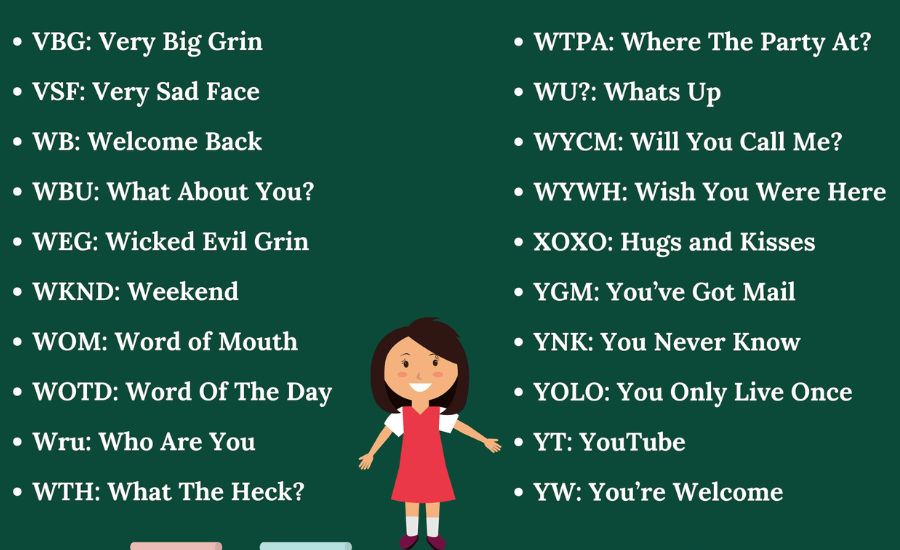
“IDTS” is unique because it shows doubt, while other slang terms might be more robust. For example, “NO” sounds firm, but “IDTS” sounds softer. It’s a perfect way to keep things polite.
Other chat slang might be more expressive. For instance, “LOL” shows laughter, but “IDTS” shows a mix of doubt and politeness. Knowing the difference helps you use the right slang in different situations.
Each slang term has a unique purpose in texts. “idts meaning in text is a polite way to decline without sounding rude.
Fun Ways to Reply with “IDTS” in Texts
“idts meaning in text” can be used in fun replies. If a friend jokes, “You’re going to finish all that pizza?” you can laugh and say, “IDTS!” It adds humor and keeps things light.
Another fun way to use “IDTS” is when unsure about something silly. If someone asks, “Will you dance on the table?” you could reply, “IDTS!” It’s a playful way to show doubt.
Using “IDTS” in funny contexts can make conversations more enjoyable. It adds a playful touch to your responses.
When Should You Use or Avoid “IDTS” in Texting?
Use “idts meaning in text” when saying “probably not” without being too strong. It’s best for casual chats with friends or family. It keeps things light, especially when you’re unsure about something.
But avoid using “IDTS” in severe or professional messages. Slang like this might sound too casual for essential topics. It’s better to use a complete sentence in those situations.
Choosing when to use “IDTS” helps keep your texts appropriate. It’s perfect for casual chats, but a complete reply is better in formal settings.
IDTS Meaning in Text and Other Popular Short Forms
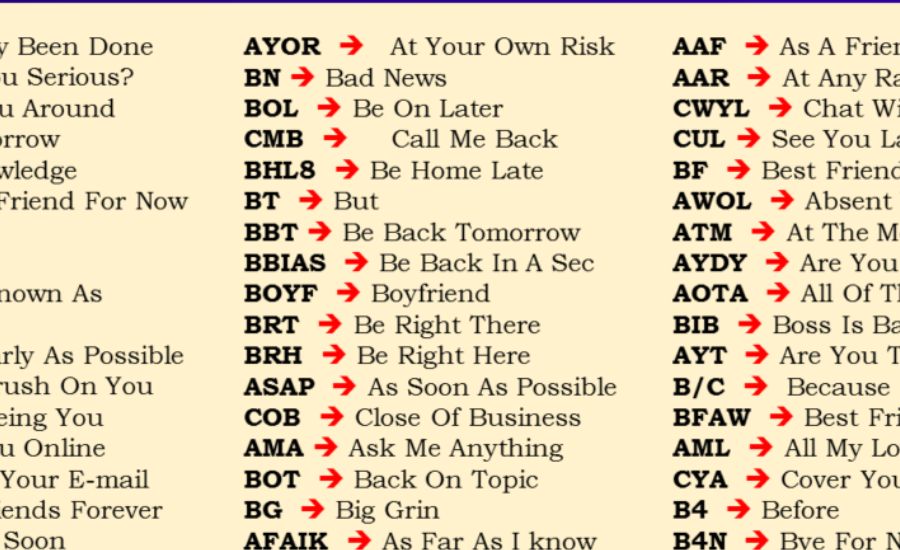
“idts meaning in text” is just one example of texting slang. Other popular short forms include “LOL” (laugh out loud) and “BRB” (be right back). These short forms keep texts fast and friendly.
Each slang term serves a different purpose. “IDTS” shows doubt, while “LOL” shows laughter. Learning these helps you keep up with common texting language.
Short forms like these make texting more accessible and more fun. Knowing their meanings makes conversations flow faster.
How to Know When “IDTS” Is the Right Response in Texts
If you feel uncertain, “idts meaning in text” is a good choice. For example, if someone asks if you’re free tomorrow and you’re unsure, reply with “IDTS.” It’s a polite way to keep the door open.
But when you’re clear about saying no, you might want to skip “IDTS.” This term is best for gentle replies, not strong ones. Choosing the right slang keeps your texts clear and friendly.
With time, you’ll know when “IDTS” fits. It’s a friendly, casual term for soft rejections or showing doubt.
Conclusion
Knowing the “IDTS meaning in the text” can help you sound friendly and polite when texting. It’s easy to show doubt or say “probably not” without sounding harsh. With just four letters, you can keep your messages quick and fun, especially with friends and family.
As more people use short forms like “IDTS,” chatting becomes smoother and faster. Now you’re ready to try using “IDTS” in your own texts! Whether you’re unsure about plans or want a soft way to disagree, “IDTS” is a great choice to keep things casual.
Do You Know: Medusa-story
FAQs
Q: What does IDTS mean in text?
A: IDTS means “I Don’t Think So.” It’s a quick way to show doubt or politely disagree.
Q: When should I use IDTS when texting?
A: Use “IDTS” when unsure or don’t want to commit fully. It’s perfect for casual conversations.
Q: Is IDTS formal or casual?
A: “IDTS” is casual and best used with friends or family in everyday texts.
Q: Can I use IDTS in professional messages?
A: No, “IDTS” is too casual for professional settings. It’s better for informal chats.
Q: How do I respond if someone sends me IDTS?
A: You can reply with more information or ask if they want to discuss it later. It shows they’re unsure.
Q: Is IDTS common in texting today?
A: Many people use “IDTS” because it’s short and polite when saying “probably not.”
Q: Are there other short forms like IDTS?
A: Yes! Other common short forms include “LOL” (laugh out loud) and “BRB” (be right back).
